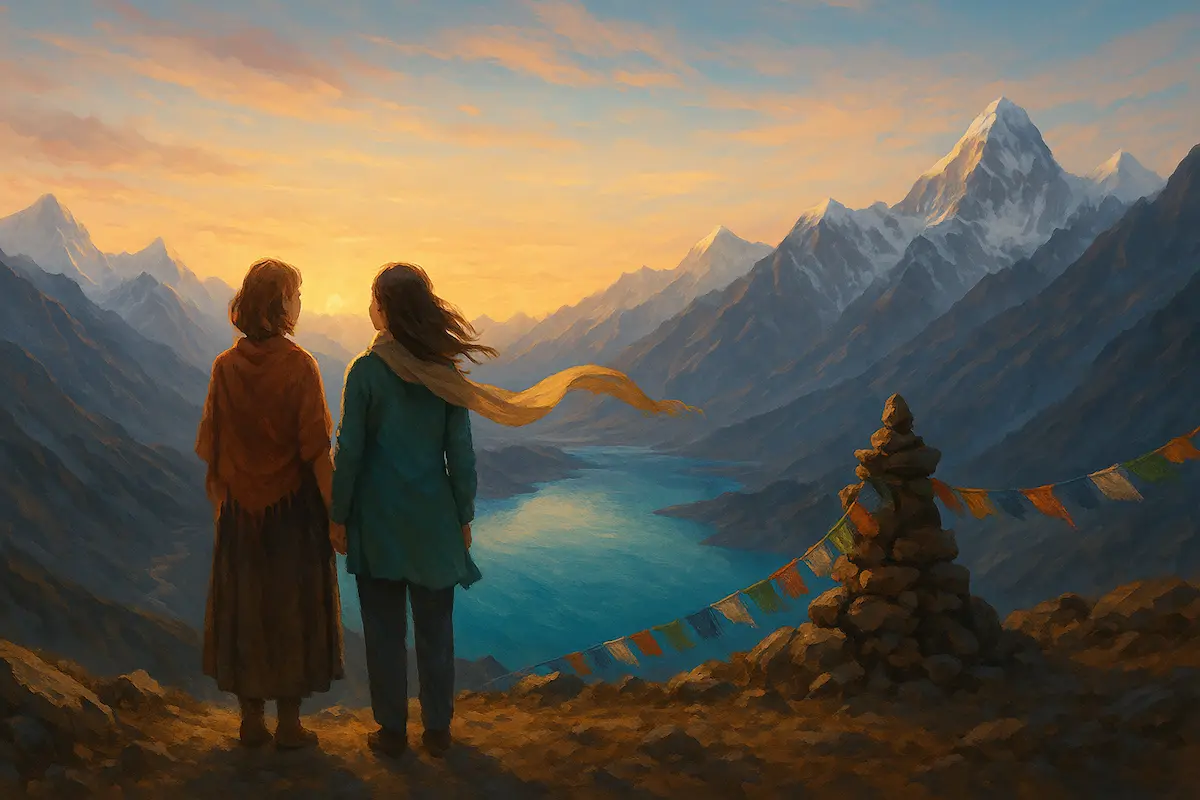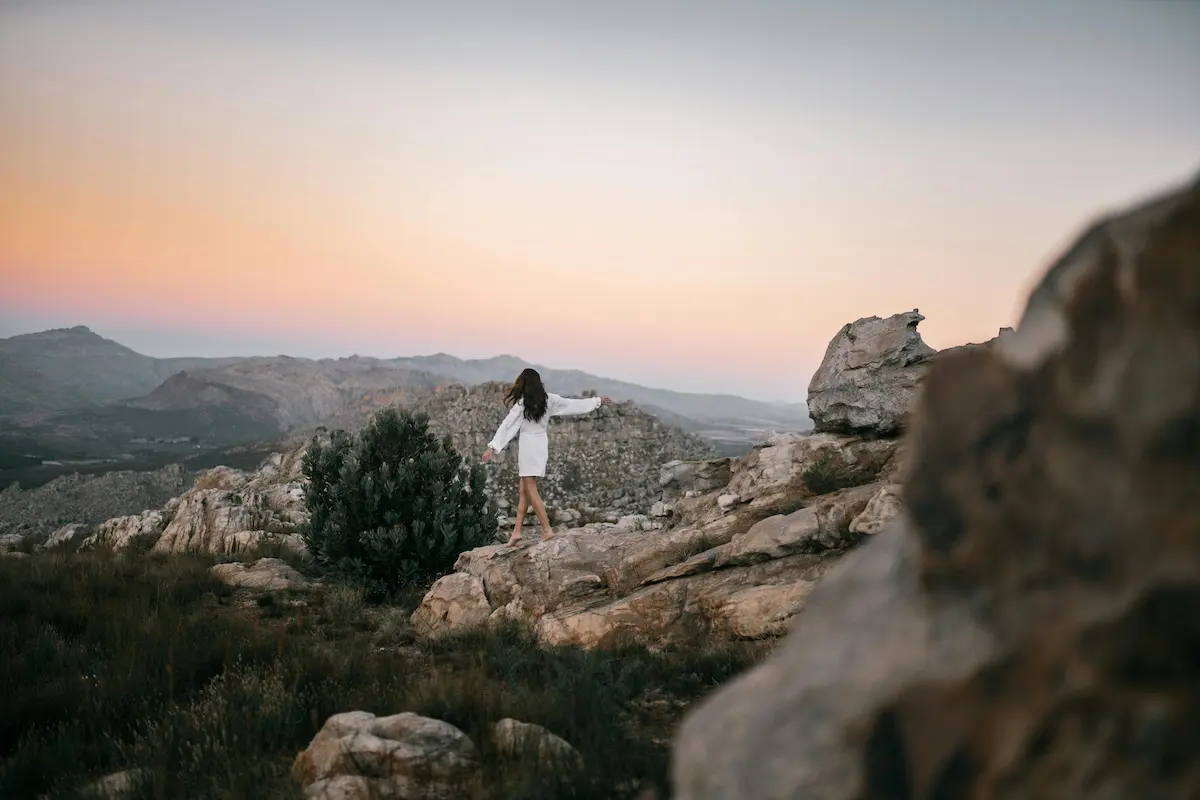This is not just a Gokyo Ri trek story—it’s a journey through grief, dreams, and the promise of renewal.
Stillness and the Stirring
Mary stood in the doorway of the spare room, staring at the faint outline of Andrea’s travel scrapbook resting on the carpet where she’d left it the night before. The air in the house felt heavier than usual—as if it, too, was waiting for something to change.
She padded barefoot into the kitchen and made tea she wouldn’t drink. The kettle clicked off with a sharp pop, but she left it untouched. Instead, she wandered back to the living room, journal in hand, urn wrapped in Andrea’s scarf, and a glass of wine already half-drunk beside the couch.
The late afternoon light filtered through the sheer curtains in long, golden strokes. Dust floated in the beams like sleeping fireflies. Outside, a car door slammed. Distant dogs barked. Life continued in its indifferent rhythm.
Mary sat cross-legged on the couch and picked up the travel printout again. Gokyo Ri. The name looked unreal on paper—like something imagined in another lifetime. Her fingers traced the outline of the mountain’s silhouette in the photo. So high. So far. So impossible.
“I tried,” she whispered.
She didn’t expect a reply. The urn, silent and small, rested beside her hip, the chill of its wood seeping through the scarf to her skin.
The wine glass emptied slowly.
The room darkened.
And somewhere between the stillness and the silence, sleep slipped in.
The Dream
Wind.
That was the first thing she felt—not heard, not saw—felt. It curled against her skin like a ribbon of breath, cool but not cold. Alive.
Mary stood barefoot on a narrow ridgeline of sunlit stone, high above a world carved from sky and silence. The air was impossibly clear, and the mountains rose around her like ancient gods: white, solemn, eternal. Snow glittered on their flanks like powdered crystal.
She didn’t question how she had gotten there. Dreams have their own logic.
She turned slowly, drawn by something more than sound.
Andrea stood a few steps away.
Her cousin wasn’t ghostly. She was radiant. Solid and soft all at once, the way you remember someone in perfect moments. She wore the scarf Mary had wrapped around the urn, its ends fluttering behind her in the wind. Her hair was swept back. Her eyes shimmered with mischief and peace—yes, somehow both at once.
No words passed between them.
None were needed.
Andrea smiled—that smile—the one from every childhood adventure, every bad joke, every moment she made the ordinary feel like magic. She extended her arm, not to pull Mary closer, but to point.
Mary followed her gaze.
And gasped.
Below them spread the Gokyo Lakes, a chain of turquoise mirrors cradled in the bowl of the earth. Prayer flags whipped in the wind nearby, tied to a cairn of stones. The sky above was so blue it almost hummed. The light made everything shimmer.

Mary felt weightless—not just in body, but in spirit. The usual ache in her chest vanished. Her heart lifted.
Andrea reached out and gently touched two fingers to Mary’s chest—over her heart. A pressure of warmth flooded through her, so intense and full it almost made her fall to her knees.
Then the wind rose.
It gathered behind them like a tide, lifting their hair, stirring the flags, whispering something not in language but in memory.
Andrea turned to her again, eyes smiling, and nodded once.
And then—
She stepped backward, dissolving into the light like morning mist.
Mary woke with a gasp, heart hammering, breath coming fast. Tears were drying on her cheeks, and the faint, impossible scent of cold mountain air still clung to her.
The urn sat on the floor beside the couch, undisturbed.
But something inside her had shifted, deep and certain.
And it wasn’t going back.
The Day After
The morning light was already pushing at the curtains when Mary stirred, her limbs heavy from the couch cushions and her mind wrapped in gauze. But the dream was still there. Not fuzzy. Not fading. Clear, like it had imprinted itself behind her eyes.
She sat up slowly. The urn remained on the floor beside her, untouched. Her hand hovered above it for a long moment, then dropped gently to the lid. She didn’t open it—but she didn’t pull away, either. She let her fingers rest there, feeling the coolness, as if waiting for a sign.
Tea. She needed tea.
She padded into the kitchen and boiled the kettle this time. No wine. Just jasmine.
While the tea steeped, a small, rhythmic tapping interrupted the quiet. She turned.
At the window, a bird—brown and white, with a splash of red at the wing—was perched on the sill, pecking softly at the glass. Tap. Tap. Tap. It cocked its head, staring at her with an odd stillness, then pecked again.
She raised an eyebrow. “Well… hello.”
It didn’t fly away.
She opened the window slightly. The bird flitted to the edge, then to a nearby tree, then back to the sill. Watching.
And for some reason she couldn’t explain, Mary grabbed a coat, slipped on her old sneakers, and stepped outside.
The air was cool and smelled faintly of pine and early flowers. She walked slowly, the bird occasionally flitting from branch to branch ahead of her like a guide. Her feet carried her without decision—down the old footpath, past the bakery and the primary school—and finally into the park near the river.
It was the place they’d played as kids.
The little lake still glistened at the center, its surface rippling faintly in the breeze. The same crooked bench stood by the water’s edge, its wood warped slightly, still painted dark green.
She remembered sailing paper boats here with Andrea—folded scraps of homework and napkins stolen from lunch. One time Andrea had insisted they were exploring the “sacred Ganges,” and declared herself High Admiral of the Spoon Fleet. Mary had nearly wet herself laughing.
She sat on the bench.
The bird landed on the far armrest, pecked once, and stood still. It was close enough for her to see its bright eye—a tiny flicker of life.
For the first time in weeks, Mary smiled. Not because something was funny—but because something inside her had loosened. A small breath, a letting go.
The dream. The bench. The bird. The memory.
None of it felt random.
She watched the bird until it flitted away, leaving only a feather on the edge of the bench.
The Commitment
Mary returned home with dirt on her shoes and the faintest sheen of peace on her skin. She didn’t notice it, not at first. But the way she moved—quieter, more deliberate—had changed.
She placed her coat on the hook. Took a long, centering breath. Then walked to the shelf in the bedroom where Andrea’s belongings were stacked in a neat corner of memory.
The guidebook was still there. The folded map, worn at the creases. A photo printout of Gokyo Ri, the same one Andrea had circled with pink pen, its edges now soft from being handled too many times.
Mary cleared the kitchen table and laid the map flat. Smoothed it gently.
Then she retrieved the urn and placed it in the center of the map like a compass stone.
She stared at it, the dream still blooming behind her eyes.
For a moment, a whisper of doubt flickered: Can I really do this? What if I fail?
But her heart answered—firm and steady—Now.
She pulled her old journal from the drawer and opened to a blank page. In quiet, slanted handwriting, she wrote:
You waited for me. I see that now.
I don’t know how this ends, or who I’ll be at the summit.
But I’m coming.
For you. For me. For all the things we said we’d do…
and for the ones we still can.
She paused, then wrote one final line beneath it.
Gokyo Ri. I’m coming.
Mary set the pen down.
The curtains were open. The light had shifted.
And for the first time since Andrea’s death, it didn’t feel like something was missing.
It felt like something was calling.
Please find Chapter One of the Gokyo Ri Trek Story here
If you want to experience the Gokyo Ri trek please join us here at Resurgence Travel.

